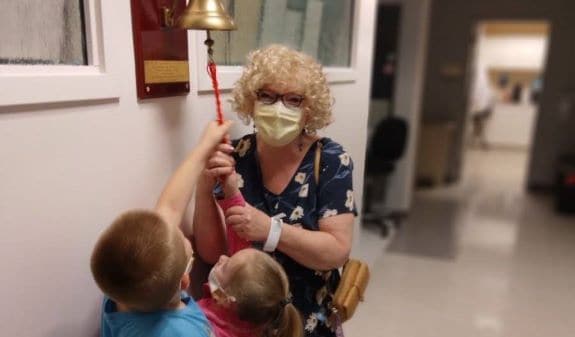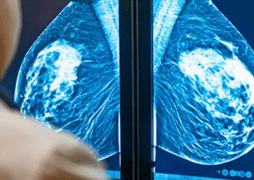With continuing advances in treatment, an increasing number of people diagnosed with breast cancer will live for many years. Today, there are more than 2.9 million breast cancer survivors in the United States.1 As survivors live longer, we are learning more about the late effects of breast cancer treatment. Treatment saves lives, but some treatments may lead to health concerns in the future. And while some late effects of breast cancer treatments are known, many are not well understood.
Managing (and when possible, preventing) these late effects of treatment is an important part of follow-up care. Here, we discuss some of the late effects from chemotherapy, targeted therapy and hormone therapy. Being aware of potential health effects may help you discuss your follow-up care with your health care provider.
Survivors also may have long-term health effects from surgery and radiation treatment for breast cancer (learn more).
Late health effects of chemotherapy
Most common side effects of chemotherapy (such as nausea and hair loss) start during treatment and go away shortly after treatment ends. However, some side effects can last for months or even years and occasionally, can be permanent. The possible health effects differ with the type of chemotherapy.
Early menopause and menopausal symptoms
Some chemotherapy drugs can stop regular menstrual periods. Although periods may start again, for women over 40, periods often do not return and menopause begins earlier than expected.2 Menopause can bring on symptoms such as hot flashes and vaginal dryness (learn more about these symptoms and ways to manage them).
Menopause can also result in a loss of bone density which can lead to osteoporosis in the future. Ways to reduce this risk are discussed below.
Early menopause and fertility
Early menopause also means an early loss of fertility. There are procedures, however, that can preserve fertility (learn more). If you wish to have a child after treatment, talk to your health care provider (and if possible, a fertility specialist) before making treatment decisions and discuss your options.
Weight gain
Weight gain (usually about five to ten pounds) is a common side effect of chemotherapy, especially in women who go into early menopause.2-3 The more weight a woman gains, the harder it is to lose.3
Maintaining a healthy weight is important for all breast cancer survivors. Heavier breast cancer survivors tend to have lower survival compared to leaner survivors.4-8 Making healthy food choices and getting regular exercise can help prevent weight gain.9-11 Learn more about a healthy diet and exercise.
Fatigue
Although often a short-term side effect of chemotherapy, fatigue can affect some people for a long time after treatment ends.12 Regular exercise (even just a daily walk) can help reduce fatigue.13 Getting a good night’s sleep is also important. Although studies of ways to ease fatigue are limited, these tips may help:14
- Switch up tasks that take more energy with those that take less energy.
- Plan daily activities. Develop a routine that prevents you from doing too much in one day.
- Delegate as much as possible (let others prepare meals and help with chores).
- Take breaks, even when you are having a good day.
- When possible, sit down to do daily activities.
Talk to your health care provider if you feel overly tired or are having problems sleeping.
Heart problems and leukemia
Heart problems and leukemia are severe but rare side effects of certain types of chemotherapy.15 These risks are related to the dose and type of chemotherapy drug, but with the doses given today, the risk of having either heart problems or leukemia is very low (about one percent).2 And, some heart problems, like cardiomyopathy (enlarged, weakened heart) and congestive heart failure can sometimes be reversed if the drugs are stopped at the first sign of heart damage.15
For some chemotherapy drugs, extra care is taken. For example, before chemotherapy with the drug doxorubicin (Adriamycin) is given, your heart is checked to make sure there are no pre-existing heart problems.
Chemo-brain
Some people have memory problems, mental “fogginess” or trouble with concentration and multi-tasking after chemotherapy.15 This condition is often called “chemo-brain”. Most people have mild symptoms, though some have more troubling problems that impact daily life. Chemo-brain may last for one to two years after treatment or even longer. Most people report the symptoms go away over time.
The link between chemo-brain and breast cancer diagnosis and treatment remains unclear. Medications used to treat some side effects of chemotherapy (such as sleeping aids and anti-nausea medications), stress, anxiety and depression can also cause these symptoms.
At this time, the true extent of chemo-brain is not well understood. The mechanisms in the body involved and who is most at risk are unclear. However, providers and researchers recognize the importance of chemo-brain as a side effect of breast cancer treatment. This is an active area of study.
Late health effects of trastuzumab
The targeted therapy drug trastuzumab (Herceptin) is used to treat HER2/neu-positive breast cancers. Trastuzumab is given for one year.
Trastuzumab is linked to congestive heart failure, a serious heart condition. In clinical trials, about two to three percent of those treated with chemotherapy plus trastuzumab had heart failure, compared to fewer than one percent of those treated with chemotherapy alone.16-18 For most people who are affected, the heart condition improves after stopping trastuzumab, but there is a small group of people who develop a permanent condition.
Before and during treatment with trastuzumab, your heart will be checked to help ensure there are no problems. To protect the heart during treatment, it may be helpful to adopt a lifestyle that includes a healthy diet, regular exercise and for those who smoke, quitting smoking.10
Late effects of hormone therapy
Hormone therapy with tamoxifen and/or aromatase inhibitors (including anastrozole, exemestane and letrozole) is a vital part of treatment for hormone receptor-positive breast cancer. Unlike chemotherapy, which is only given for weeks or months, hormone therapy is taken for a total of five years. Depending on your situation, you may take tamoxifen alone, tamoxifen followed by an aromatase inhibitor or an aromatase inhibitor alone.
Even though most side effects from hormone therapy tend to go away once treatment ends, they can be difficult to tolerate for such a long time. Some of the most common side effects of hormone therapies, like hot flashes, may become less frequent and less intense over time. Other side effects, however, may occur later and have a more lasting impact on health. Although rare, there are some serious health risks with hormone therapy (listed in the table below).
| Health Risks of Hormone Therapies19-25 | |
| Tamoxifen | Aromatase inhibitors |
| – Uterine cancer (cancer of the uterus) – Endometrial cancer (cancer of the lining of the uterus) – Deep venous thrombosis (blood clots in the large veins) – Pulmonary emboli (blood clots in the lungs) – Stroke – Cataracts | – Joint and muscle pain – Loss of bone density (may lead to osteoporosis or bone fractures) – Increased blood pressure Increased cholesterol |
Aromatase inhibitors have fewer serious health risks than tamoxifen. However, aromatase inhibitors can cause joint and muscle pain and affect bone health (see below). The length of treatment with aromatase inhibitors coupled with these side effects can make completing therapy difficult and can lead some women to stop treatment.26-28 This is very concerning because completing the full course of hormone therapy is important to get the most survival benefit. Hormone therapy lowers the risk of breast cancer recurrence and death.29-30
Aromatase inhibitors and joint and muscle pain
Joint pain (also called arthralgia) and muscle pain (also called myalgia) are common side effects of aromatase inhibitors. The pain may be in the hands and wrists, feet and ankles, knees, back or other parts of the body.26,31 Up to 36 percent of women in clinical trials have reported joint pain and up to 15 percent have reported muscle pain (other studies have reported higher rates of these effects).26-27,31
If you have joint or muscle pain while taking an aromatase inhibitor, talk to your health care provider. Although there is ongoing research studying the best ways to treat joint and muscle pain, your provider may be able to treat these symptoms. He/she may recommend nonsteroidal anti-inflammatory medications (such as aspirin or ibupropin), special exercises or acupuncture to ease the pain.31-32 Your provider may also switch you to another aromatase inhibitor (you may have less pain with a different drug).27,32
Although aromatase inhibitors can cause joint and muscle pain, they do not cause permanent joint or muscle damage.
Aromatase inhibitors and loss of bone density
Aromatase inhibitors can cause a loss of bone density, which leads to higher rates of osteoporosis and bone fractures compared to tamoxifen.25
Ways to manage bone density loss
There are many ways women who lose bone density (due to aromatase inhibitor use or due to menopause) can improve their bone health. Regular exercise can help strengthen and protect bones.33 For example, weight-bearing exercise (exercise that involves standing rather than sitting) can lower the risk of hip fractures and protect bone density.10 Getting enough calcium and vitamin D and for those who smoke, quitting smoking are other ways to strengthen bones.33 Some medications may also help prevent osteoporosis.
Summary
Breast cancer survivors may face long-term side effects from treatment. Late effects differ from treatment to treatment and from person to person. Although some of these health conditions are serious, many can be managed. Talk to your health care provider about the possible late effects you may have after treatment ends and ways you can manage (or prevent) them.
According to Patricia A. Ganz, M.D., Professor at the UCLA Schools of Medicine & Public Health, “Chemotherapy and other targeted therapies play an essential role in improving the survival outcomes for women with breast cancer, but they are not without some personal costs. Most women get through treatments with very few lingering side effects, but about 25 percent of women may have persistent side effects from chemotherapy (e.g., fatigue, cognitive complaints)34-35 and many more may experience menopause-related symptoms either from the chemotherapy or long-term hormone therapies. Many of these symptoms can be managed successfully if you talk to your treatment team about them. It is particularly important that you take your hormone therapy as prescribed. Don’t just quit, talk to your team to get them to address your symptoms or switch to an alternate treatment.”
References
- Siegel R, Desantis C, Virgo K, et al. Cancer treatment and survivorship statistics, 2012. CA Cancer J Clin. 2012 Jun 14. [Epub ahead of print].
- Partridge AH, Winer EP. Long-term complications of adjuvant chemotherapy for early stage breast cancer. Breast Dis. 21:55-64, 2004.
- Saquib N, Flatt SW, Natarajan L, et al. Weight gain and recovery of pre-cancer weight after breast cancer treatments: evidence from the women’s healthy eating and living (WHEL) study. Breast Cancer Res Treat. 105(2):177-86, 2007.
- Majed B, Moreau T, Senouci K, Salmon RJ, Fourquet A, Asselain B. Is obesity an independent prognosis factor in woman breast cancer? Breast Cancer Res Treat. 111(2):329-42, 2008.
- Chen X, Lu W, Zheng W, et al. Obesity and weight change in relation to breast cancer survival. Breast Cancer Res Treat. 122(3):823-33, 2010.
- Protani M, Coory M, Martin JH. Effect of obesity on survival of women with breast cancer: systematic review and meta-analysis. Breast Cancer Res Treat. 123(3):627-35, 2010.
- Ewertz M, Jensen MB, Gunnarsdóttir KA, et al. Effect of obesity on prognosis after early-stage breast cancer. J Clin Oncol. 29(1):25-31, 2011.
- Imkampe AK, Bates T. Impact of a raised body mass index on breast cancer survival in relation to age and disease extent at diagnosis. Breast J. 16(2):156-61, 2010.
- Demark-Wahnefried W, Case LD, et al. Results of a diet/exercise feasibility trial to prevent adverse body composition change in breast cancer patients on adjuvant chemotherapy. Clin Breast Cancer. 8(1):70-9, 2008.
- Harris SR, Schmitz KH, Campbell KL, McNeely ML. Clinical practice guidelines for breast cancer rehabilitation: syntheses of guideline recommendations and qualitative appraisals. Cancer. 118(8 Suppl):2312-24, 2012.
- Rock CL, Doyle C, Demark-Wahnefried W, et al. Nutrition and physical activity guidelines for cancer survivors. CA Cancer J Clin. 2012 Apr 26. [Epub ahead of print].
- Goedendorp MM, Andrykowski MA, Donovan KA, et al. Prolonged impact of chemotherapy on fatigue in breast cancer survivors: A longitudinal comparison with radiotherapy-treated breast cancer survivors and noncancer controls. Cancer. 2011 Nov 15. [Epub ahead of print].
- Fong DY, Ho JW, Hui BP, et al. Physical activity for cancer survivors: meta-analysis of randomised controlled trials. BMJ. 344:e70, 2012.
- Shapiro CL. Side effects of adjuvant chemotherapy for early stage breast cancer, in Up-to-Date (Hayes DF, Dizon DS, eds.). Up-to-Date, 2012.
- Azim HA Jr, de Azambuja E, Colozza M, Bines J, Piccart MJ. Long-term toxic effects of adjuvant chemotherapy in breast cancer. Ann Oncol. 22(9):1939-47, 2011.
- Gianni L, Dafni U, Gelber RD, et al. for the Herceptin Adjuvant (HERA) Trial Study Team. Treatment with trastuzumab for 1 year after adjuvant chemotherapy in patients with HER2-positive early breast cancer: a 4-year follow-up of a randomised controlled trial. Lancet Oncol. 12(3):236-244, 2011.
- Perez EA, Romond EH, Suman VJ, et al. Four-year follow-up of trastuzumab plus adjuvant chemotherapy for operable human epidermal growth factor receptor 2-positive breast cancer: joint analysis of data from NCCTG N9831 and NSABP B-31. J Clin Oncol. 29(25):3366-73, 2011.
- Slamon D, Eiermann W, Robert N, et al. for the Breast Cancer International Research Group. Adjuvant trastuzumab in HER2-positive breast cancer. N Engl J Med. 365(14):1273-83, 2011.
- Coombes RC, Kilburn LS, Snowdon CF, et al. for the Intergroup Exemestane Study (IES). Survival and safety of exemestane versus tamoxifen after 2-3 years’ tamoxifen treatment (Intergroup Exemestane Study): a randomised controlled trial. Lancet. 369(9561):559-70, 2007.
- National Cancer Institute. Tamoxifen. http://www.cancer.gov/cancertopics/factsheet/Therapy/tamoxifen, 2008.
- Goss PE, Ingle JN, Pater JL, et al. Late extended adjuvant treatment with letrozole improves outcome in women with early-stage breast cancer who complete 5 years of tamoxifen. J Clin Oncol. 26(12):1948-55, 2008.
- Mouridsen H, Giobbie-Hurder A, Goldhirsch A, et al. for the BIG 1-98 Collaborative Group. Letrozole therapy alone or in sequence with tamoxifen in women with breast cancer. N Engl J Med. 361(8):766-76, 2009.
- Cuzick J, Sestak I, Baum M, et al. for the ATAC/LATTE investigators. Effect of anastrozole and tamoxifen as adjuvant treatment for early-stage breast cancer: 10-year analysis of the ATAC trial. Lancet Oncol. 11(12):1135-41, 2010.
- Goss PE, Ingle JN, Alés-Martínez JE, et al. for the NCIC CTG MAP.3 Study Investigators. Exemestane for breast-cancer prevention in postmenopausal women. N Engl J Med. 364(25):2381-91, 2011.
- Amir E, Seruga B, Niraula S, Carlsson L, Ocaña A. Toxicity of adjuvant endocrine therapy in postmenopausal breast cancer patients: a systematic review and meta-analysis. J Natl Cancer Inst. 103(17):1299-309, 2011.
- Dent SF, Gaspo R, Kissner M, Pritchard KI. Aromatase inhibitor therapy: toxicities and management strategies in the treatment of postmenopausal women with hormone-sensitive early breast cancer. Breast Cancer Res Treat. 126(2):295-310, 2011.
- Briot K, Tubiana-Hulin M, Bastit L, Kloos I, Roux C. Effect of a switch of aromatase inhibitors on musculoskeletal symptoms in postmenopausal women with hormone-receptor-positive breast cancer: the ATOLL (articular tolerance of letrozole) study. Breast Cancer Res Treat. 120(1):127-34, 2010.
- Murphy CC, Bartholomew LK, Carpentier MY, Bluethmann SM, Vernon SW. Adherence to adjuvant hormonal therapy among breast cancer survivors in clinical practice: a systematic review. Breast Cancer Res Treat. 2012 Jun 12. [Epub ahead of print].
- Dowsett M, Cuzick J, Ingle J, et al. Meta-analysis of breast cancer outcomes in adjuvant trials of aromatase inhibitors versus tamoxifen. J Clin Oncol. 28(3):509-18, 2010.
- Davies C, Godwin J, Gray R, et al. for the Early Breast Cancer Trialists’ Collaborative Group (EBCTCG). Relevance of breast cancer hormone receptors and other factors to the efficacy of adjuvant tamoxifen: patient-level meta-analysis of randomised trials. Lancet. 378(9793):771-84, 2011.
- Crew KD, Greenlee H, Capodice J, et al. Prevalence of joint symptoms in postmenopausal women taking aromatase inhibitors for early-stage breast cancer. J Clin Oncol. 25(25):3877-83, 2007.
- Brennan ME, Houssami N. Overview of long term care of breast cancer survivors. Maturitas. 69(2):106-12, 2011.
- Hadji P, Body JJ, Aapro MS, et al. Practical guidance for the management of aromatase inhibitor-associated bone loss. Ann Oncol. 19(8):1407-16, 2008.
- Ahles TA, Saykin AJ. Candidate mechanisms for chemotherapy-induced cognitive changes. Nat Rev Cancer. 7(3):192-201, 2007.
- Bower JE, Ganz PA, Desmond KA, et al. Fatigue in long-term breast carcinoma survivors: a longitudinal investigation. Cancer. 106(4):751-8, 2006.



